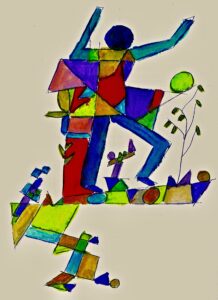It was then and not now that I was the ‘youngest’ of 6 sitting on the wooden bench in the gym locker room. Time flies, or is it that it stumbles along?
After working out, the six of us would often gather on the bench in the last row of the locker room. We were done working out and now talked about all sorts of things, especially aging. Even if we had all the gym equipment at home, we wouldn’t work out regularly if it didn’t include our social chatter. The gym was part of our life.
We didn’t have to rush to work early in the morning. Nevertheless, we were a busy bunch mowing the lawn, shopping for nothing we needed, visits to the library, and at the top of the list, to-dos, visits to doctors. It was our golden years, which we all knew was a bad joke.
There was plenty of room on the long wooden bench that stood between two rows of lockers. We weren’t in a hurry to leave the gym after working out and showering. We stayed and talked about our lives and often repeated ourselves, but rarely said, “you told us that before”. We sometimes had lunch together. Together we would attend the funeral of our gym friends and, of course, when one of us died. Now that leaves only 2 of us, me, the youngest of the group, and Henry, the oldest.
Exercising kept getting harder and harder. We were slipping down a slippery slope faster and faster, and talked about that with elements of dismay. I suggested that we start a pool with each of us putting in one hundred dollars. The last one alive collects the money. My gym buddies thought that was a morbid idea. I tried to convince them otherwise. “Oh, come on. Call it gallows humor.”
Paul, the second oldest in our group, sat at the end of the gym bench and was the least connected to the rest of us. He was a swimmer and didn’t use the gym equipment. He had a hearty, solid, huge gut and a booming laugh. Ask him, “How are you?” He always answered “Perfect.” He had owned a series of dry cleaners. We heard that his employees and some of his customers viewed him as obnoxious, a bit of a jerk. Collectively, we agreed, but so what? We came in every flavor. Over and over, he told us that his daughters took good care of him and that everything was great, really great. He was the first of our group to die, a massive heart attack.
Irv Schmetterling was the shortest of our group. His last name in German means butterfly, so we all called him Butterfly. Butterfly was a serious diabetic. He always had fruit with him, usually bananas, along with a syringe and insulin. We would run to get help when he would occasionally lose consciousness. Butterfly had several accidents in the gym parking lot, which the rest of us figured had something to do with his diabetes, but he denied that. No doubt he didn’t want to stop driving. His diabetes was not nearly as big a problem as his wife, who hated him. He told us some of the details of that part of his life. Butterfly would sometimes tell us stories about being a lawyer with the VA. The stories were particularly amusing when told with his distinct Brooklyn accent. Neither he nor we were surprised when his wife dumped him in a nursing home in New York. None of us ever saw him again. He died a year after he left us behind.
Henry was the oldest in our gym group. Back then, he was 97 and still pushing iron and moving up and down on an elliptical device. Henry was short and painfully thin, literally skin and bones. He had an amazing history. His career ended as a linguistics professor at Rutgers, but started as a young boy who escaped Vienna on a Kindertransport to England. Later, during the Second World War, he was in the British army. He then went to Israel, was in the Israeli army, and then came to the US. Henry could be impossible. He was easily insulted if you didn’t listen to every word of his rants about how he was mistreated by everyone at his assisted living apartment building. The last time Henry and Butterfly talked to one another, Henry went on and on with his endless list of grievances, and Butterfly started laughing. Henry flew into a rage. He would never again acknowledge Butterfly’s presence. Not surprising that his wife left him decades ago and now he was our Henry.
Marion was a remarkable old man. He was one-quarter American Indian. He grew up in an orphanage in Oklahoma. He was mellow, wise, kind-spirited, and a committed Christian.
We were all impressed that he had been a Navy SEAL and also flown Navy dirigibles. One particularly vivid story he told was how the airship he was flying flipped over in a huge storm. He then navigated the huge airship while standing on the instrument panel. One day, I asked, “Can I join your Indian tribe? I want to start a gambling casino near Washington.” Marion laughed. “Didn’t think there were many German Jewish Indians from a village near the Black Forest.”
Elie, the ex-pharmacist, was quick-witted and caustic. He also was the most dedicated to an exercise regime. Elie was special. He had been living for twelve years with a heart transplant and lots of antirejection meds. Amazing. Then one day, he suddenly died.
Len was the only true Republican in our group. We particularly enjoyed talking politics with him because he was always thoughtful, smart, and an impressive history scholar. I told him he should have been an academic. He smiled. “And be around all you liberal types? No. Being an engineer and builder is more my speed.” He always smiled and was totally accepting of all our foibles.
It was sad seeing Len start to lose it; first, his short-term memory and then his thinking started to become mushy.
Len ended up in a nearby nursing home. I would visit him regularly. I knew he really liked jelly beans, peanuts/peanut butter, and halvah. I made sure he had a good supply of his favorite goodies. He started to get thinner and thinner. I would sometimes sit with him at lunch in the dining room of the institution that was now his home. He just picked at his food. I asked, “Len, what would tickle your appetite? How about if next time I visit, I’ll bring you a hot pastrami sandwich?” Len responded with the barest of enthusiasm. A week later, when I brought a huge overstuffed pastrami sandwich, he took one bite and said, “Why don’t you finish it.”
He died a few weeks later.
Now there were just two of us. I especially missed Len.
I wondered aloud, “Who will be next? Whose tombstone will be a reminder of who we were?
Time kept creeping on, and the only ones left of our group on the wooden bench in the locker room were Henry and me.
Progress. The gym management refurbished the locker room, took out that long wood bench, and replaced it with short, stubby ones made of a plastic material that looked like wood.
Henry is now 101 but seems to have finally lost it since he comes to the gym with an aide. There are new oldies in the gym. Not the same as our special group of back then. The new gym members include a lawyer, a chemist, and an anthropologist turned lawyer. They are all interesting but can’t replace my old buddies. Increasingly, women have joined the gym, and some are amazing athletes. They remind me that at one time, youth was part of who I was. Nothing stays the same.
Time stumbles on
Part 2
Henry is now 101 but seems to have finally lost it. He comes to the gym with an aide. He no longer drives his car, whose dents are dented. He hasn’t lost his disdain for those who don’t admire him. Time marches, no crawls on.
From the locker room come new oldies who have spilled over into the gym. Most don’t know who came before them. Fine. Why would you expect these newbies to really replace our special group of back then oldies? They mingle, groan, complain, and complain about aging and hear a chorus of refrains. New gym members include a lawyer, a chemist, a shrink, an anthropologist turned lawyer, a retired dentist, a real-estate mogul, and they have come all over to entertain and commiserate with their fellow prisoners in the Golden Years Club. And yet aside from working out, they are committed to each other. They guide each other in the use of the gym equipment, but most of all, they need to have their stories, their life stories, heard.
We are all storytellers, and they hone that skill on the gym floor.
They are all interesting, but can’t replace my old buddies.
The new wave of gym buddies comes in every flavor and style. The dentist wants us to read his book, which is a short hand for “Look what I wrote and I too matter.” Many of us are surprised that the shrink never listens to what you have to say but breaks in to tell his latest mishap or victory of a life stumble. The chemist annoys all of us since he reliably appears out of nowhere, breaks into ongoing conversations as if we have been waiting for him to join us. But, of course, but, we all tolerate each other’s idiosyncrasies and annoyances.
To the delight of the old guys in the gym many women have joined the gym. Most are old but then there are some younger women who get our attention, but without staring at them. Time has flown by for us. We no longer attract their attention. Some of them are amazing athletes. Some of us comment, “Wow. You are in fantastic shape. They smile and thank them for letting them know we appreciate their presence. We are left wondering, wandering back to another time in their lives.
I think one day I will ask one of the women whether they form groups sitting on the benches in their locker room.
And time creeps forward, leaving nothing the same.

